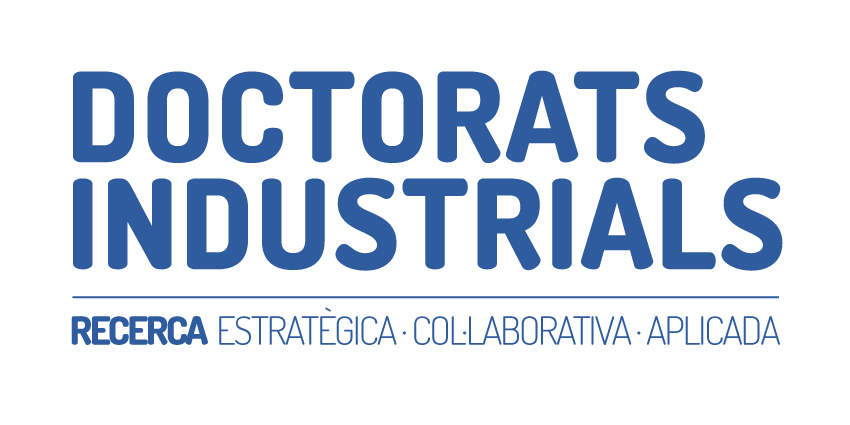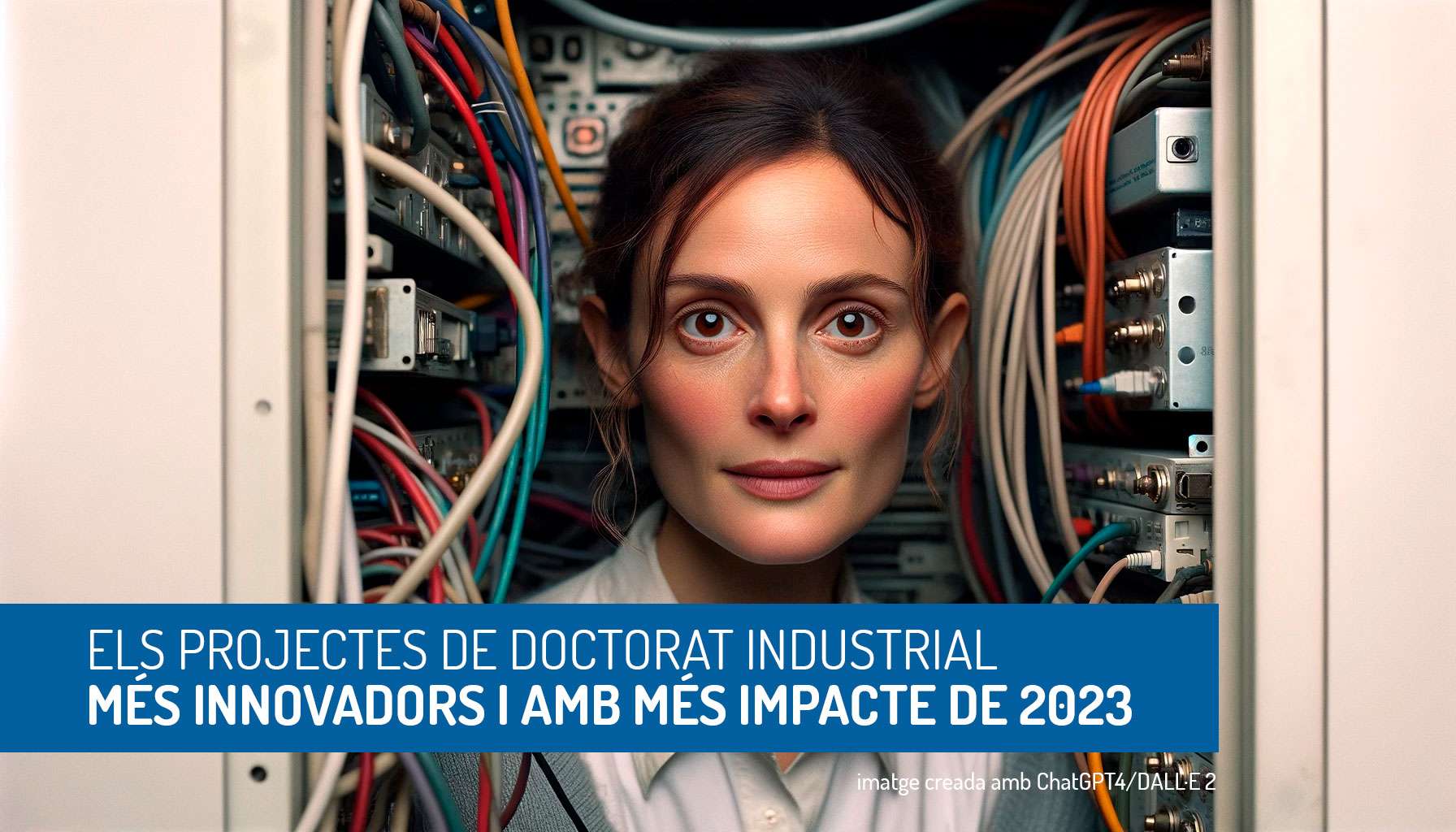
2023 has been an important year for the Industrial Doctorates (DI) Plan of the Department of Research and Universities, culminating its first ten years in operation with a total of 918 strategic, collaborative and applied research projects.
Rstrategic research because companies and institutions have a long-term vision, and want to contribute to the economic and social development of the country, facing a challenge that currently has no answer. Collaborative research, because this strategic challenge is answered through collaboration with a university or research centre, making the knowledge and infrastructures of the academic environment available. Finally, applied research because it is research that is close to the current or future needs of society, ensuring that the results have a tangible and beneficial return for all citizens.
In short, all the projects that are part of the DI Plan in one way or another have a significant and positive impact on collective well-being. It is for this reason that from the DI Plan we consider it very important to commit to a culture of scientific communication and dissemination of research to the public, with the consequent dissemination of the results and the activity of hundreds of active research projects each year. Beyond the dissemination of the results, the communication around this research helps to amplify the socioeconomic impact of these projects, as well as to give visibility to the human teams behind them and to value the figure of doctoral staff in non-academic environments.
In this article, we have made a selection of projects that we consider to be a good example of social impact, which we have monitored throughout 2023 in order to communicate their research, and their impact on the day-to-day lives of citizens.
1. THE SUCCESSFUL CAREER OF INDUSTRIAL DOCTOR BEATRIZ GARCÍA ADVANCES RESEARCH INTO RESPIRATORY DISEASES IN PIGS
The industrial doctor García Morante, with her extensive international experience, provides innovative solutions to the research of pig respiratory diseases, impacting a key area for the Catalan livestock industry.
- Industrial doctor: Beatriz García Morante.
- Research area: Biotechnology.
- Collaboration: Boehringer Ingelheim company with the Centre for Research in Animal Health (CReSA) and the Autonomous University of Barcelona.
- Project focus: study of M. hyopneumoniae and its impact on pig farms.
- Objectives: to improve experimental conditions and provide tools for the pharmaceutical industry.
- Impact: relevant results for future scientific studies and practical applications.
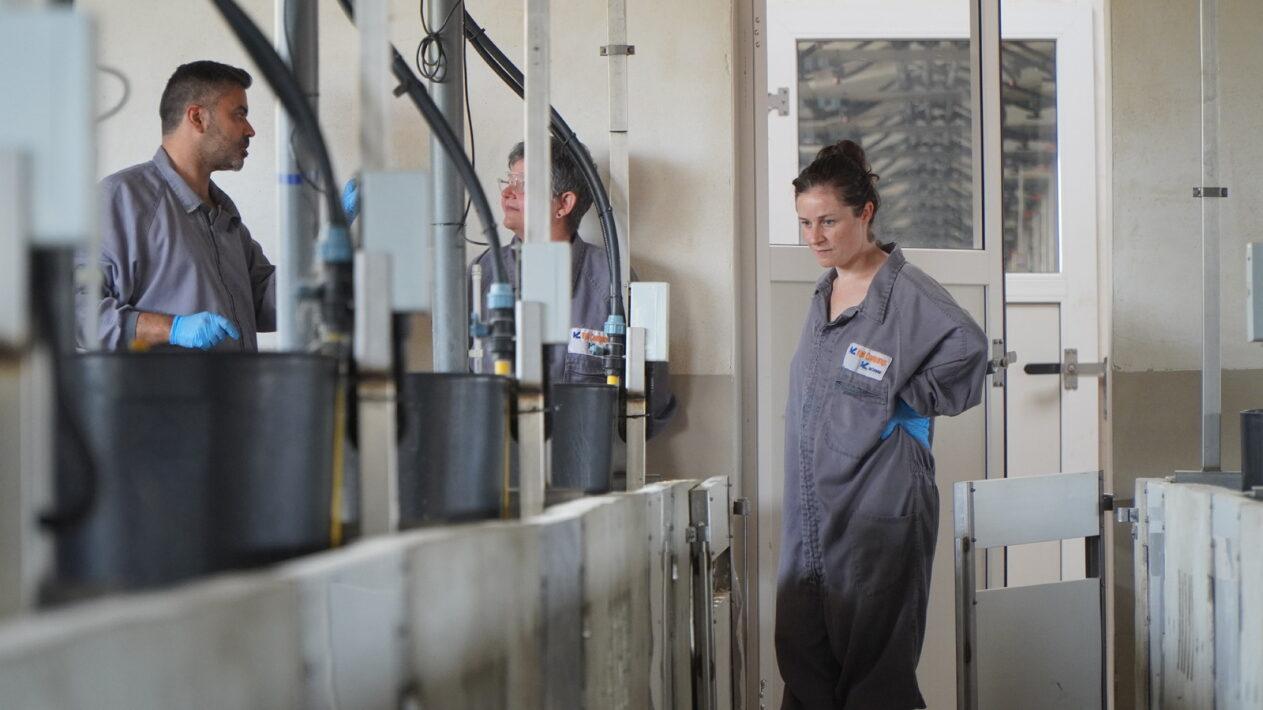
The career of industrial doctor García Morante is a success story and a source of inspiration for future industrial doctoral students. From her work in Germany to her teaching experience in the United States, Dr. García Morante has demonstrated an adaptability and vision that are fundamental in the world of collaborative research. His research applied to respiratory diseases in the pig sector has had a considerable impactin the academic, industrial and social fields.
His industrial doctorate project was developed with the collaboration between the international pharmaceutical company Boehringer Ingelheim, the Centre for Research in Animal Health (CReSA) which is part of the Institute of Agri-Food Research and Technology (IRTA) and the Autonomous University of Barcelona (UAB).
To put the project into context, it should be noted that the pig industry has a very important weight in Catalonia and is one of the main ones in Europe. For this reason, it is crucial that all parties, in this case the pigs, are in the best possible state of health. His research focused on the study of the bacterium M. hyopneumoniae, a significant problem in pig farms around the world, causing respiratory infections. The research raises many still unanswered questions about how exactly this bacterium works. One of the reasons is the complex pathogenesis of this disease, which poses a challenge for researchers and animal health professionals.
The project has made it possible to improve the conditions of the experimental model of M. hyopneumoniae with a greater impact on the reproduction of pneumonia in pigs. The results of this research are very relevant because they serve as a basis for future scientific studies, but they are also a powerful tool for pharmaceutical companies.
You can read the full report at this link.
2. IENAI SPACE'S APPLIED RESEARCH IN NANOSATELLITE SPACE PROPULSION LITS, PIONEER IN THE AEROSPACE INDUSTRY
IENAI Space, the company that is revolutionizing the propulsion of nanosatellites, and that wants to lead innovation in the European aerospace industry.
- Industrial Doctor: Raúl Ramos
- Research area: aerospace engineering.
- Collaboration: company IENAI SPACE with the Autonomous University of Barcelona and the Institute of Microelectronics of Barcelona.
- Project focus: development of the first electrospray propulsion system for nanosatellites in Europe.
- Objectives: to improve the mobility of nanosatellites and extend their useful life.
- Impact: reduction of space debris, nanofabrication of components for electrospray motors.

The company IENAI SPACE in collaboration with the Autonomous University of Barcelona and the Institute of Microelectronics of Barcelona (IMB-CNM-CSIC) is developing the first electrospray-based propulsion system for nanosatellites in Europe. This technology represents a very significant advance in the mobility of nanosatellites.
The fact is that this innovation, the result of the research project led by industrial doctoral student Raúl Ramos, not only improves the mobility of nanosatellites, but also addresses other challenges. The project has provided an innovation that has a great impact on the aerospace industry, facilitating the efficient maneuvering of satellites, extending their useful life and contributing to the reduction of space debris.
Specifically, the project focuses on the nanofabrication of components for electrospray motors. These components are vital for Microelectromechanical Systems (MEMS), which play a fundamental role in the operation of motors. The technology uses ionic liquids as fuel, allowing the emission of charged particles by propulsion. This offers the ability to adjust to different space mission needs, while MEMS provide diverse functions on a microscopic scale.
The project has achieved significant milestones, including collaboration with the European Space Agency, standing out as a key technology in the new era of space exploration. In conclusion, Ienai Space's technology is on track to become a key component in the new era of space exploration, with the potential to radically change how we understand and manage mobility in space.
You can read the full report at this link.
3. PLATING DECOR AND THE UB COLLABORATION THEY WORK TOGETHER TO REDUCE THE ENVIRONMENTAL IMPACT OF THEIR GARMENT COATING PROCESS
With a focus on sustainability, the company Plating Decor and the University of Barcelona have established a strategic alliance to innovate in the field of sustainable and eco-efficient coatings in materials.
- Industrial doctor: Mohamed Amazian.
- Research area: Materials engineering and industrial processes.
- Collaboration: Plating Decor S.L. and the University of Barcelona.
- Focus of the project: improvement of sustainability in coating processes.
- Objectives: to reduce toxic components, to explore sustainable uses of metals.
- Impact: transformation of polluting industrial processes.
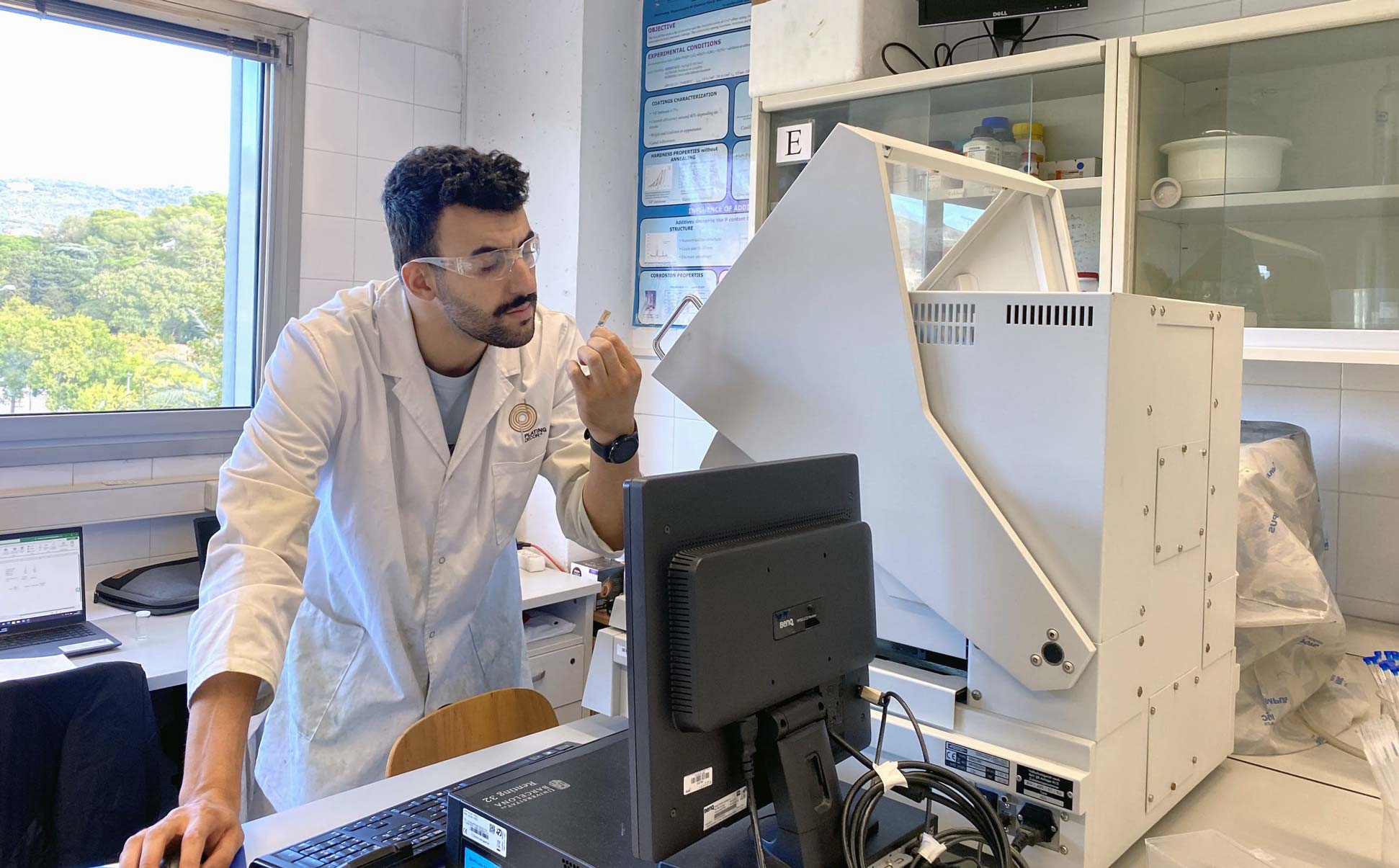
The company Plating Decor and the University of Barcelona (UB) are collaborating on an industrial doctorate project to improve the sustainability of their garment coating processes. This project, led by industrial doctoral student Mohamed Amazian El Moussaoui, seeks to reduce the environmental impact of coating baths that contain harmful components, such as cyanides.
The company, which specialises in the treatment of precious metal surfaces for various sectors, including jewellery, uses an electroplating technique. This technique consists of covering objects with a thin layer of metal using electric current. Amazian's research focuses on 18-carat gold coating, looking for more sustainable alternatives. Gold coatings have increasingly diverse applications in industrial processes, from the manufacture of electronic components to catalysis.
This project not only aims to improve the coating process, but also to explore the use of metals in processes that contribute to a more sustainable future, such as the transformation of atmospheric CO₂. Amazian highlights the importance of research in reducing toxic components, finding more robust manufacturing processes and looking for alternative applications.
The collaboration between Plating Decor and UB represents an effort to transform polluting industrial processes into more ecological ones, with a potential impact beyond the decorative coatings industry.
You can read the full report at this link.
4. ORGANIC DELTA RICE PROMOTES AGRICULTURAL SUSTAINABILITY IN THE EBRO DELTA
The Organic Delta Rice project, led by the company Agroserveis.cat and the University of Barcelona, is redefining rice production in the Ebro Delta, focusing on sustainable and ecological practices.
- Industrial doctor: Alfred Palma.
- Research area: biotechnology and biosystems engineering.
- Collaboration: Agroserveis.cat company and the University of Barcelona.
- Project focus: promotion of biodiversity and sustainability in rice production
- Objectives: implementation of organic rice cultivation in the Ebro Delta and sustainable alternatives in rice management.
- Impact: alliance of the entire rice sector of the Ebro Delta, providing socio-economic opportunities to young farmers and generating sustainable and ecological alternatives for rice management.
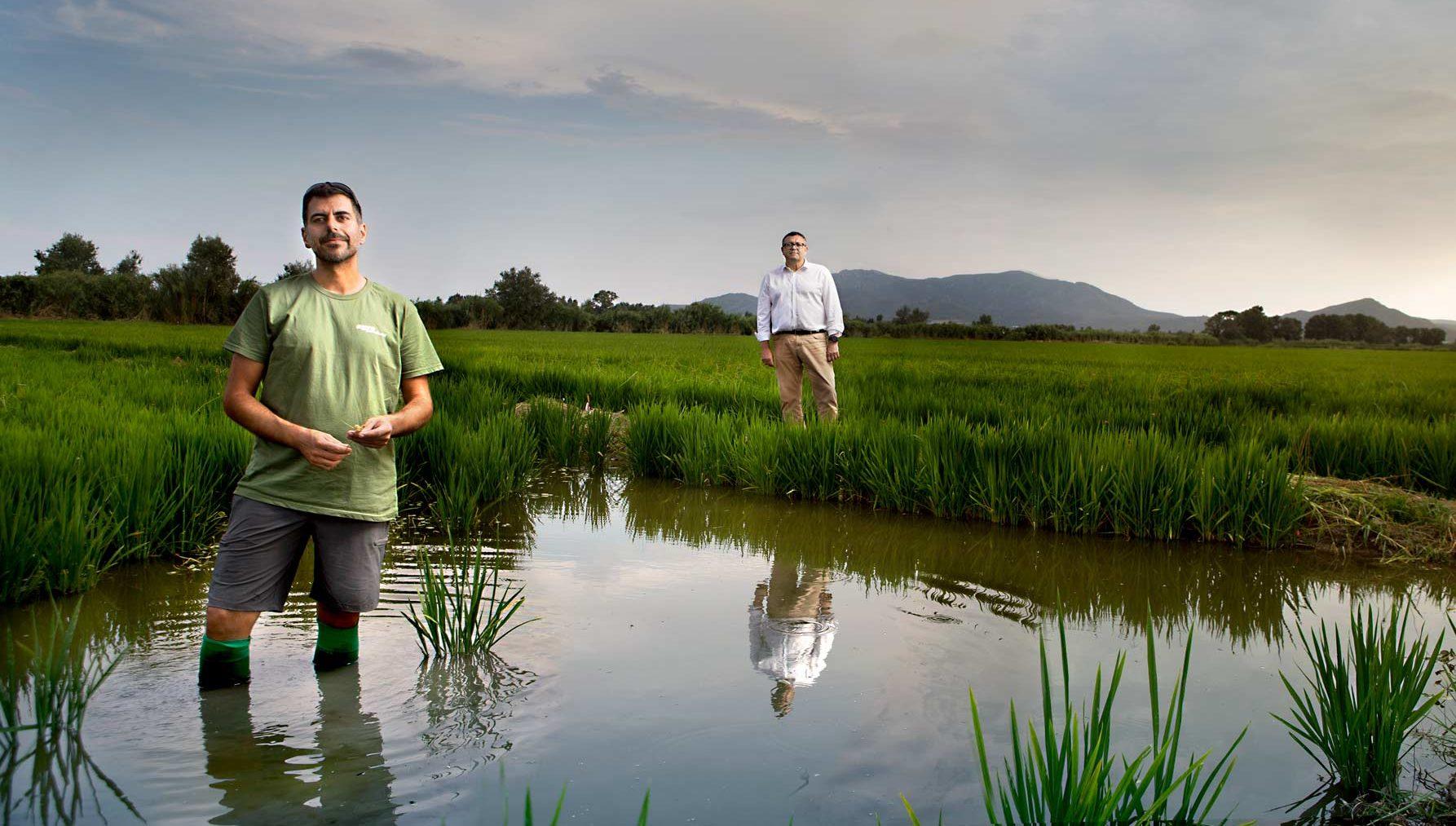
The Delta Rice Organic Project, promoted by the company Agroserveis.cat in collaboration with the University of Barcelona, seeks to transform the rice production model in the Ebro Delta towards greater sustainability. The initiative promotes biodiversity and provides socio-economic opportunities to young farmers, while betting on organic products with quality certification, providing added value to rice, thus promoting agricultural sustainability in this region.
Alfred Palma, industrial doctoral student and technical director of Agroserveis.cat, leads this innovative research, facing the ambitious challenge of managing both the company's technical management and academic research simultaneously.
The project focuses on the production of organic rice with quality certification with the seal of the Catalan Council for Organic Production (CCPAE), awarded to agricultural and food products that comply with the regulations established for organic production. It also guarantees that the products have been grown or processed following the organic farming practices set out in the European regulation, promoting practices that respect the natural environment and increase biodiversity. The proposal of this project is to look for sustainable alternatives for rice management, respecting organic production regulations.
A key part of the project is to encourage the participation of young people in agriculture and to avoid the growing concentration of rice land in the hands of fewer and fewer farmers. In this way, the project seeks to preserve the agrarian character of the Ebro Delta, maintaining its natural and cultural values.
The project also includes experiments in weed management, selection of rice varieties and the use of organic fertilizers. A project that has received the support of the local rice sector and other entities linked to rice production. In short, the project brings the alliance of the entire rice sector to promote a common initiative for the Ebro Delta region as one of its main advances.
In summary, the Delta Rice Organic Project represents an innovative and environmentally friendly approach to agriculture in the Ebro Delta, combining food production and biodiversity conservation.
You can read the full report at this link.
5. THE SAFE BEACHES PROJECT REVOLUTIONIZES THE SAFETY OF THE BEACHES OF CATALONIA
The Safe Beaches project, an initiative of Auditek and the Rovira i Virgili University, is setting new standards and improvements in the safety and efficiency of lifeguard services on the beaches of Catalonia.
- Industrial doctor: Pablo Martin
- Research area: innovation in resource management.
- Collaboration: Auditek company and Rovira i Virgili University.
- Focus of the project: optimization of lifeguard management.
- Objectives: to improve safety and efficiency in beach lifeguarding.
- Impact: more equitable and efficient management of beach safety.
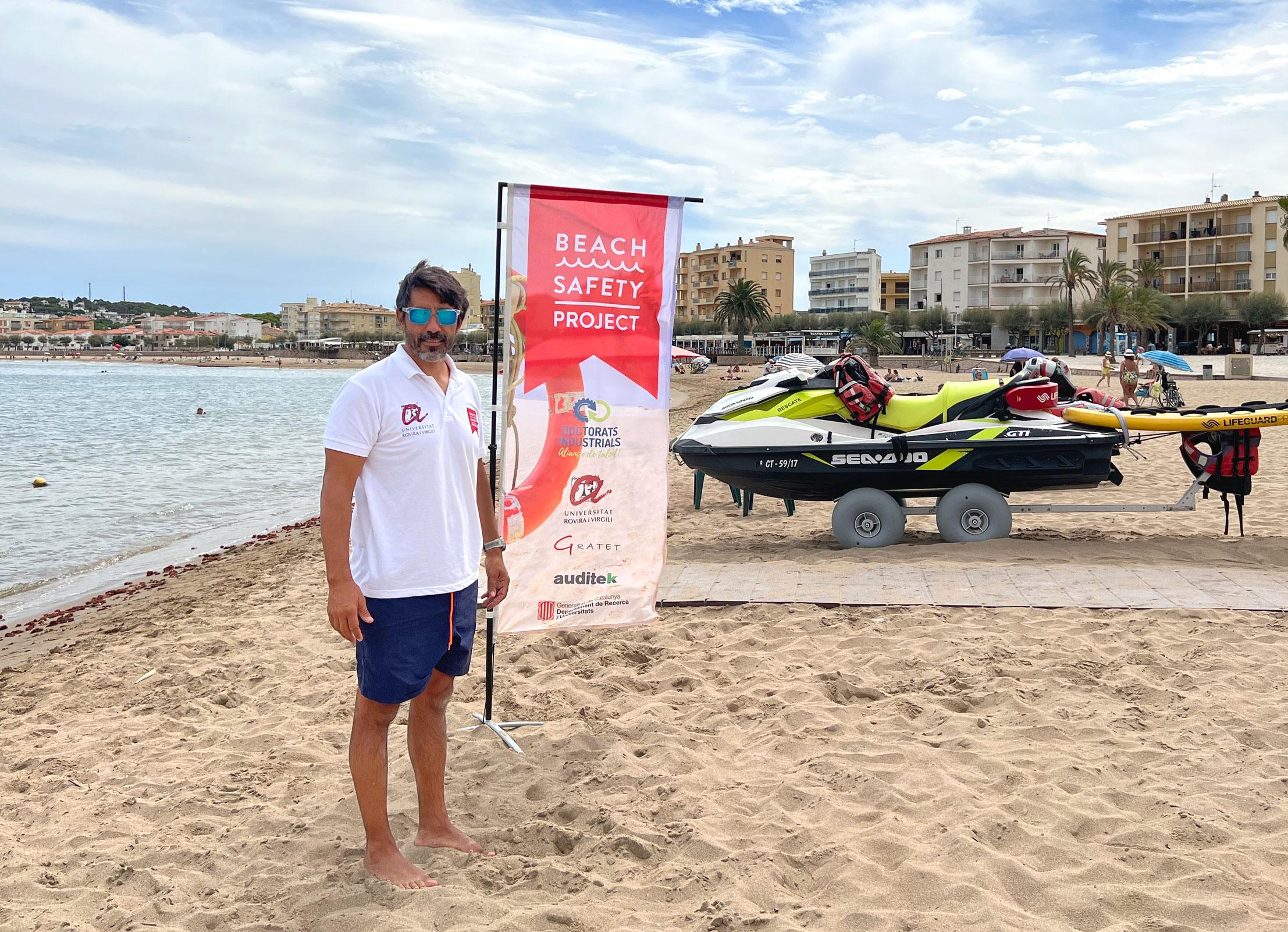
Safe Beaches, a collaborative initiative between Auditek and the Rovira i Virgili University, aims to improve the safety and efficiency of lifeguard services on Catalan beaches. Through innovative tools, this project aims to revolutionize the management of lifeguard services, allowing better coordination, faster responses and a more effective allocation of resources.
To carry out this task, the project addresses the problem of inequality in lifeguard services. In Catalonia, with its almost 700 km of beaches spread over 70 municipalities, there is a lack of a comprehensive rescue system. The current distribution of rescue resources is uneven, depending on the economic capacity of each municipality, a situation that the project aims to improve.
The collaborative research between the company Auditek and the Rovira i Virgili University has made it possible to develop tools and models for safer beaches and more efficient services for all users. The project, led by industrial doctoral student Pablo Martin, is developed by the Research Group on Territorial Analysis and Tourism Studies (GRATET) of the Rovira i Virgili University, with the support of the University of Murcia. The seed of the project began in 2020 with a complete study of lifeguard services on more than 500 Catalan beaches.
One of the central elements is the use of a Geographic Information System (GIS) for a more accurate analysis, such as the identification of areas with the most incidents using heat maps. This technology improves the management and response to the specific needs of each beach. Also noteworthy is the use of the "infoplatges" application for the georeferencing of incidents.
The project not only aims to improve lifeguard services, but also to promote a more equitable and efficient management of safety on the beaches, based on objective data and not exclusively on the availability of municipal economic resources.
You can read the full report at this link.
6. THE BENEFITS OF ART ON MENTAL HEALTH, OBJECTIVE OF THE INDUSTRIAL DOCTORATE IN OSONAMENT
Art as a therapeutic tool, applied research that investigates the effects of artistic creation on the improvement of psychological well-being.
- Industrial doctor: Jaume Cases.
- Research area: prevention, diagnosis and treatment in mental health.
- Collaboration: Osonament company and the University of Vic.
- Project focus: analysis of the impact of art on mental health.
- Objectives: integration of art into the social and health model.
- Impact: promotion of social inclusion through art.

Art can improve mental and emotional health and promote social integration, according to studies carried out by different institutions. Osonament, a non-profit organization, started the "Artistic Couples" project in 2006 with the idea of creating pairs formed by an artist linked to mental health resources and an artist from the community to create joint works of art. These activities have proven to be useful for people with severe mental disorders, helping them to express emotions and feelings creatively.
The project has helped many people with mental health problems to improve their psychological well-being, and is now the subject of an industrial doctoral project in collaboration with the University of Vic – Central University of Catalonia to assess its impact on participants. The initiative led by Jaume Cases, an industrial doctoral student and occupational therapist, seeks to delve into the question of how art and culture can also promote the social participation of people with mental health problems.
The project analyzes the impact of art on mental health, including aspects such as social participation, psychological well-being, recovery, stigma in mental health, creative self-efficacy, among others. The aim is to consolidate these interventions as part of the socio-health model, recognising collaborative art as a tool to generate social bonds and spaces for co-creation and mutual learning.
In summary, the Osonament project and Jaume Cases' research highlight art as a powerful therapeutic tool, capable of promoting social inclusion and emotional well-being, especially in people with mental health problems.
You can read the full report at this link.
7. MUSIC AND TECHNOLOGY MERGE IN A PROJECT BETWEEN BMAT AND UPF
A pioneering strategic research project in audio fingerprinting, integrating music, mathematics and deep learning algorithms to revolutionise music monitoring in noisy environments.
- Industrial Doctor: Guillem Cortès.
- Research area: systems and communication engineering.
- Collaboration: BMAT company and Pompeu Fabra University.
- Project focus: innovation in audio fingerprinting for noisy environments.
- Objectives: to improve musical monitoring in multiple scenarios.
- Impact: applications in the music industry and professional musicians.
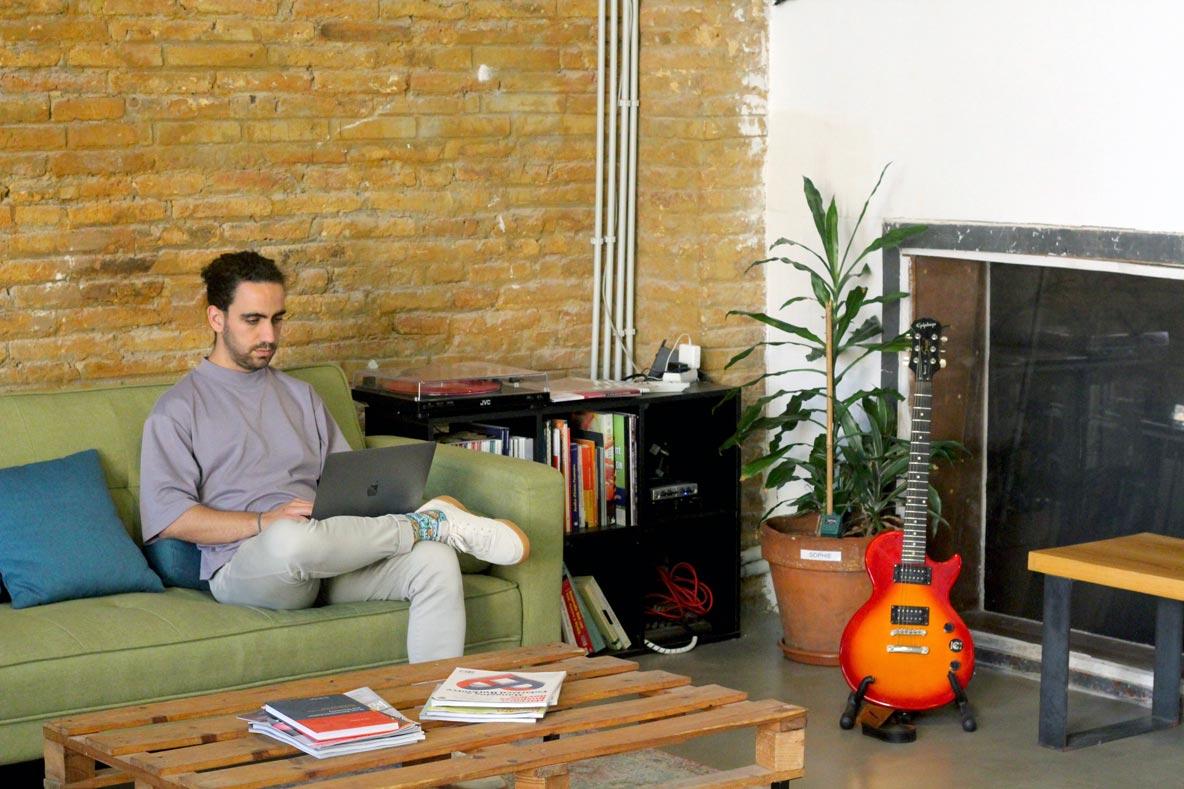
The company BMAT, in collaboration with Pompeu Fabra University (UPF), is working on an industrial doctoral project that revolutionizes the technology behind the identification of music in noisy environments and complex situations. This technology, known as Audio Fingerprinting, consists of identifying an audio recording using unique characteristics of its signal. It is a technology that is well known to the population, as it is responsible for finding out which song is playing in a bar when we use mobile applications dedicated to this task.
Sound recognition, essential in areas such as security, music and advertising, still represents a considerable challenge, especially in environments with background noise such as concerts, bars or outdoor shows. The NextCore project of BMAT, a company born as a spin-off of UPF in 2005, seeks to overcome these challenges. This is the company's second industrial doctorate project, and the results of the first project already completed have been incorporated into the services offered by BMAT.
The research of the project is in the hands of Guillem Cortès, industrial doctoral student in this second project carried out at BMAT in collaboration with UPF. Cortès, passionate about music, explores the intersection between music and mathematics, keys to understanding the relationship between sounds and frequencies. In this case, the research aims to improve music monitoring systems and make them more robust in multiple scenarios, as well as to create tools to incentivize. Specifically, it aims to improve music monitoring through deep learning algorithms.
In conclusion, thanks to the collaboration between BMAT and UPF, the NextCore project can change the way music monitoring systems adapt to noisy environments. This research, which combines music and mathematics, has the potential to encourage the development of new tools in the field of audio identification.
You can read the full report at this link.
8. AN INDUSTRIAL PHD PROJECT INVESTIGATES THE PSYCHOLOGICAL AND EDUCATIONAL EFFECTS OF BOARD GAMES IN THE CLASSROOM
The company Mercurio and the University of Lleida collaborate in this industrial doctorate project to explore how board games in the classroom can improve students' learning and mental health, with a focus on the pedagogical selection of games and the social dynamics they generate.
- Industrial PhD student: Núria Vita-Barrull
- Research area: prevention, diagnosis and treatment in mental health.
- Collaboration: company Mercurio, the University of Lleida and the NeuroPGA research group.
- Project focus: study of the psychological and educational benefits of board games in primary education.
- Objectives: to provide scientific evidence on the cognitive benefits of board games.
- Impact: practical implementation in classrooms, improvement in learning and mental health of students.
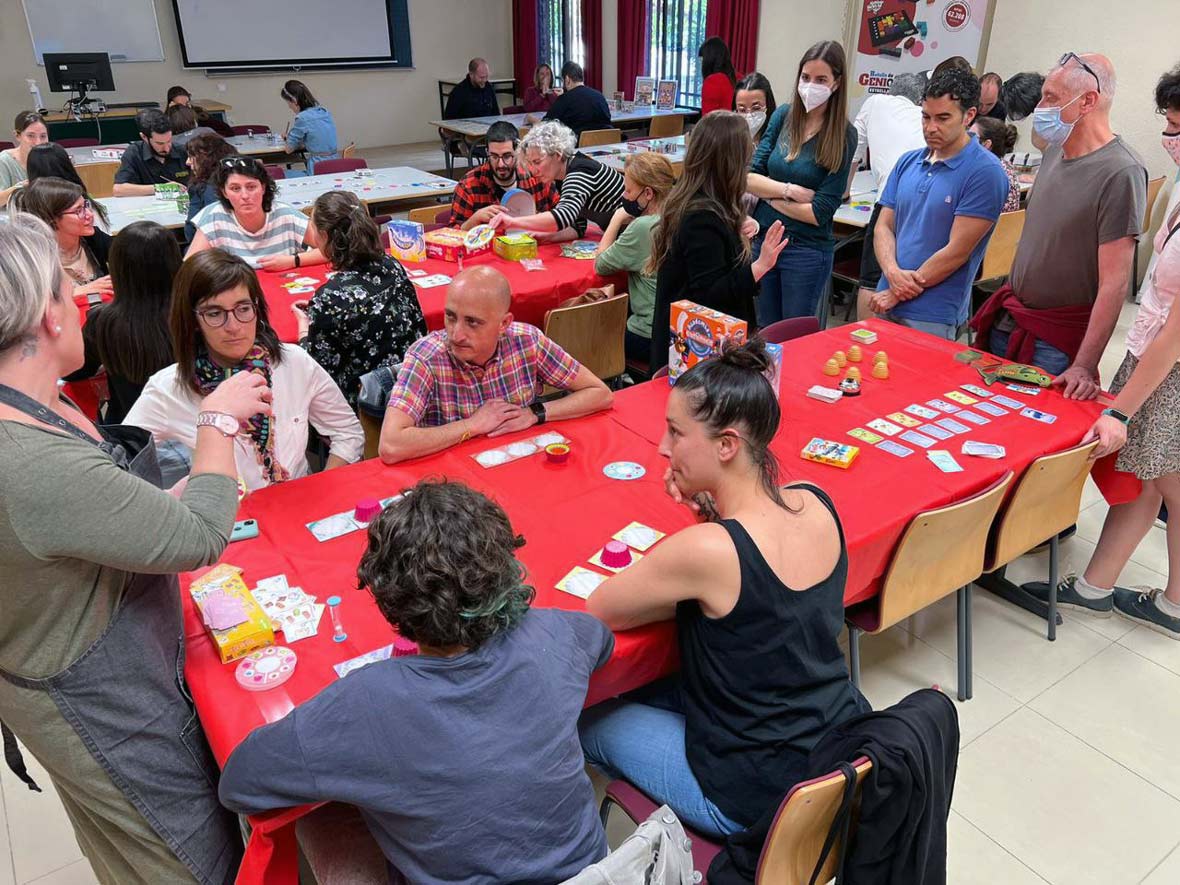
This industrial doctorate project of the company Mercurio, in collaboration with the NeuroPGA research group of the University of Lleida, investigates the psychological and educational benefits of board games in the school environment. This strategic project, led by industrial doctoral student Núria Vita-Barrull, focuses on the use of modern board games as cognitive training tools in primary education, based on the question: what is the scientific basis behind the benefits of board games?
The main objective of the project is to provide scientific evidence on the cognitive benefits of board games, especially in basic executive functions such as adaptation to the environment, impulse control, planning and other key skills. This evidence is essential to justifythe use of board games in primary school classrooms, providing a rigorous and critical look. The NeuroPGA group has been conducting research in this field since 2014, demonstrating the effectiveness of board games in children with ADHD and the elderly.
The project also explores the importance of social interaction that arises during play, as well as the process of selecting games by teachers to ensure that they meet educational objectives. The collaboration between Mercurio Distribuciones, the AFIM21 association (Atención Familia, Infancia y Mayores), and the University of Lleida has allowed the practical implementation of board games in the classrooms, reaching several students and generating growing interest among professionals and the scientific community.
The reality is that the experience is being introduced into the classrooms, during the 2021-2022 academic year the project has brought board games to 5 schools in Lleida and 4 in Madrid, thus reaching a considerable number of participating students. This research highlights the importance of games in education, beyond simple fun, and promotes the use of board games as pedagogical tools in the school environment. In short, the project will allow there to be more research collaborations in this line in the coming years, thus improving the applications of recreational programs in the classroom.
You can read the full report at this link.
In conclusion, the industrial doctorate projects presented in this article illustrate the diversity and scope of institutions and areas of knowledge of strategic, applied and collaborative research promoted by the Industrial Doctorates Plan of the Department of Research and Universities of the Generalitat de Catalunya.
A research that includes all areas of knowledge in the total set of more than 900 projects promoted by this program. Projects that, on the other hand, not only have a direct impact on their respective areas of specialization, but also contribute significantly to the economic, technological and social development of Catalan society.
The collaboration between the research ecosystem and universities and the socio-economic fabric, the key feature of these projects, demonstrates the added value of strategic alliances in the promotion of research, innovation and knowledge transfer to society. A synergy that becomes an essential asset to face the challenges of the future, fostering a culture of strategic, collaborative and applied research with an inherent component of social impactand knowledge transfer.
For more information on previous projects, see our article on the best DI project reports of 2022.
